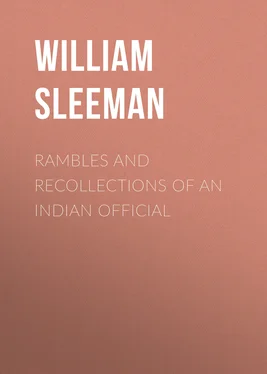William Sleeman - Rambles and Recollections of an Indian Official
Здесь есть возможность читать онлайн «William Sleeman - Rambles and Recollections of an Indian Official» — ознакомительный отрывок электронной книги совершенно бесплатно, а после прочтения отрывка купить полную версию. В некоторых случаях можно слушать аудио, скачать через торрент в формате fb2 и присутствует краткое содержание. Жанр: Путешествия и география, История, foreign_edu, foreign_antique, foreign_prose, на английском языке. Описание произведения, (предисловие) а так же отзывы посетителей доступны на портале библиотеки ЛибКат.
- Название:Rambles and Recollections of an Indian Official
- Автор:
- Жанр:
- Год:неизвестен
- ISBN:нет данных
- Рейтинг книги:4 / 5. Голосов: 1
-
Избранное:Добавить в избранное
- Отзывы:
-
Ваша оценка:
- 80
- 1
- 2
- 3
- 4
- 5
Rambles and Recollections of an Indian Official: краткое содержание, описание и аннотация
Предлагаем к чтению аннотацию, описание, краткое содержание или предисловие (зависит от того, что написал сам автор книги «Rambles and Recollections of an Indian Official»). Если вы не нашли необходимую информацию о книге — напишите в комментариях, мы постараемся отыскать её.
Rambles and Recollections of an Indian Official — читать онлайн ознакомительный отрывок
Ниже представлен текст книги, разбитый по страницам. Система сохранения места последней прочитанной страницы, позволяет с удобством читать онлайн бесплатно книгу «Rambles and Recollections of an Indian Official», без необходимости каждый раз заново искать на чём Вы остановились. Поставьте закладку, и сможете в любой момент перейти на страницу, на которой закончили чтение.
Интервал:
Закладка:
'But what', said he with a smile, 'could you expect from men who believe that Indra is the god who rules the heavens immediately over the earth, that he sleeps during eight months in the year, and during the other four his time is divided between his duties of sending down rain upon the earth, and repelling with his arrows Rājā Bali, who by his austere devotions ( tapasya ) has received from the higher gods a promise of the reversion of his dominions? The lightning which we see', said the learned Maulavī, 'they believe to be nothing more than the glittering of these arrows, as they are shot from the bow of Indra upon his foe Rājā Bali '. 74 74 There is a sublime passage in the Psalms of David, where the lightning is said to be the arrows of God. Psalm lxxvii: 17, 'The clouds poured out water: the skies sent out a sound: thine arrows also went abroad. 18. The voice of thy thunder was in the heaven; the lightnings lightened the world: the earth trembled and shook.' [W. H. S.] The passage is quoted from the Authorized Bible version; the Prayer Book version is finer.
'But, my good friend Maulavī Sāhib, there are many good Muhammadans who believe that the meteors, which we call shooting stars, are in reality stars which the guardian angels of men snatch from the spheres, and throw at the devil as they see him passing through the air, or hiding himself under one or other of the constellations. Is it not so?'
'Yes, it is; but we have the authority of the holy prophet for this, as delivered down to us by his companions in the sacred traditions, and we are bound to believe it. When our holy prophet came upon the earth, he found it to be infested with a host of magicians, who, by their abominable rites and incantations, get into their interest certain devils, or demons, whom they used to send up to heaven to listen to the orders which the angels received from God regarding men and the world below. On hearing these orders, they came off and reported them to the magicians, who were thereby enabled to foretell the events which the angels were ordered to bring about. In this manner they often overheard the orders which the angel Gabriel received from God, and communicated them to the magicians as soon as he could deliver them to our holy prophet. Exulting in the knowledge obtained in this diabolical manner, these wretches tried to turn his prophecies into ridicule; and, seeing the evil effects of such practices among men, he prayed God to put a stop to them. From that time guardian angels have been stationed in different parts of the heavens, to keep off the devils; and as soon as one of them sees a devil sneaking too near the heaven of heavens, he snatches the nearest star, and flings it at him.' 75 75 'We guard them from every devil driven away with stones; except him who listeneth by stealth, at whom a visible flame is darted.' Korān, chapter 15, Sale's translation. See post , end of this chapter.
This, he added, was what all true Muhammadans believed regarding the shooting of stars. He had read nothing about them in the works of Plato, Aristotle, Hippocrates, or Galen, all of which he had carefully studied, and should be glad to learn from me what modern philosophers in Europe thought about them.
I explained to him the supposed distance and bulk of the fixed stars visible to the naked eye; their being radiant with unborrowed light, and probably every one of them, like our own sun, the great centre of a solar system of its own; embracing the vast orbits of numerous planets, revolving around it with their attendant satellites; the stars visible to the naked eye being but a very small portion of the whole which the telescope had now made distinctly visible to us; and those distinctly visible being one cluster among many thousand with which the genius of Galileo, Newton, the Herschells, and many other modern philosophers had discovered the heavens to be studded. I remarked that the notion that these mighty suns, the centres of planetary systems, should be made merely to be thrown at devils and demons, appeared to us just as unaccountable as those of the Hindoos regarding Indra's arrows.
'But', said he, 'these foolish Hindoos believe still greater absurdities. They believe that the rainbow is nothing but the fume of a large snake, concealed under the ground; that he vomits forth this fume from a hole in the surface of the earth, without being himself seen; and, when you ask them why, in that case, the rainbow should be in the west while the sun is in the east, and in the east while the sun is in the west, they know not what to say.' 76 76 Nine Hindoos out of ten, or perhaps ninety-nine in a hundred, throughout India, believe the rainbow to arise from the breath of the snake, thrown up from the surface of the earth, as water is thrown up by whales from the surface of the ocean. [W. H. S,]
'The truth is, my friend Maulavī Sahib, the Hindoos, like a very great part of every other nation, are very much disposed to attribute to supernatural influences effects that the wiser portion of our species know to rise from natural causes.'
The Maulavī was right. In the Mishkāt-ul- Masābih , 77 77 'Mishkāt is a hole in a wall in which a lamp is placed, and Masābih the plural of "a lamp", because traditions are compared to lamps, and this book is like that which containeth a lamp. Another reason is, that Masābih is the name of a book, and this book comprehends its contents' (Matthews's translation, vol. i, p. v, note).
the authentic traditions of their prophet, 78 78 The full title is Mishkāt-ul-Masābih, or a Collection of the most Authentic Traditions regarding the Actions and Sayings of Muhammed; exhibiting the Origin of the Manners and Customs; the Civil, Religious, and Military Policy of the Muslemāns . Translated from the original Arabic by Captain A. N. Matthews, Bengal Artillery. Two vols. 4to; Calcutta, 1809-10, This valuable work, published by subscription, is now very scarce. A fine copy is in the India Office Library.
it is stated that Ayesha, the widow of Muhammad, said, 'I heard His Majesty say, "The angels come down to the region next the world, and mention the works that have been pre-ordained in heaven; and the devils, who descend to the lowest region, listen to what the angels say, and hear the orders predestined in heaven, and carry them to fortune-tellers; therefore, they tell a hundred lies with it from themselves "' 79 79 Book xxi, chapter 3, part i; vol. ii, p. 384. The quotations as given by the author are inexact. The editor has substituted correct extracts from Matthews's text. Matthews spells the name of the prophet's widow as Aáyeshah.
'Ibn Abbās said, "A man of His Majesty's friends informed me, that whilst His Majesty's friends were sitting with him one night, a very bright star shot; and His Highness said, "What did you say in the days of ignorance when a star shot like this?" They said, "God and His messenger know best; we used to say, a great man was born to-night, and a great man died." 80 80 In Sparta, the Ephoroi, once every nine years, watched the sky during a whole cloudless, moonless night, in profound silence; and, if they saw a shooting star, it was understood to indicate that the kings of Sparta had disobeyed the gods, and their authority was, in consequence, suspended till they had been purified by an oracle from Delphi or Olympia. [W. H. S.] This statement rests on the authority of Plutarch, Agis , 11.
Then His Majesty said, "You mistook, because the shootings of these stars are neither for the life nor death of any person; but when our cherisher orders a work, the bearers of the imperial throne sing hallelujahs; and the inhabitants of the regions who are near the bearers repeat it, till it reaches the lowest regions. After the angels which are near the bearers of the imperial throne say, "What did your cherisher order?" Then they are informed; and so it is handed from one region to another, till the information reaches the people of the lowest region. Then the devils steal it, and carry it to their friends, (that is) magicians; and these stars are thrown at these devils; not for the birth or death of any person. Then the things which the magicians tell, having heard from the devils, are true, but these magicians tell lies, and exaggerate in what they hear".'
Интервал:
Закладка:
Похожие книги на «Rambles and Recollections of an Indian Official»
Представляем Вашему вниманию похожие книги на «Rambles and Recollections of an Indian Official» списком для выбора. Мы отобрали схожую по названию и смыслу литературу в надежде предоставить читателям больше вариантов отыскать новые, интересные, ещё непрочитанные произведения.
Обсуждение, отзывы о книге «Rambles and Recollections of an Indian Official» и просто собственные мнения читателей. Оставьте ваши комментарии, напишите, что Вы думаете о произведении, его смысле или главных героях. Укажите что конкретно понравилось, а что нет, и почему Вы так считаете.












